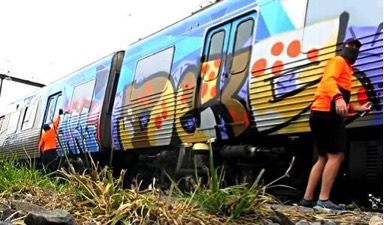
Graffiti problem in Melbourne transport
by Yair Frid, onGraffiti Removal , September 3, 2018

by Yair Frid, onGraffiti Removal , September 3, 2018
There are many consequences of graffiti offences in the public transport, from increasing costs of removal to accidents and delays. The annual expense of cleaning up across the network has increased to over $10 million, money that could be used to improve the network instead.
Every month, tags have to be removed from stations and trains, Metro numbers account for around 1500 tags in stations, 1400 on the inside of trains and 75 on the exterior. Each month the Metro staff cleans up to 12,000m sq of graffiti from stations and other structures. The team works efficiently to allow trains to be back in service within one day, therefore, more than 60 specialists in graffiti removal are required.
As a result of graffiti offences several trains are delayed, causing on average 49 delays every month across the rail network in Melbourne. Consequently, many passengers are affected when a train has to be removed from the network to be cleaned.
Metro and Victoria Police have worked closely in order to reduce the vandalism incidents so the delays don’t affect commuters. In the past three years, 113 people have been charged with graffiti offences. And in 2015 the Operation Deep Clean was launched resulting in 139 people cautioned and another 135 fined.
The main tool used by police and Metro’s security has been the CCTV system, which has allowed to track vandals and even gather information to catalogue every tag. Victoria Police along with interstate and international police and public transport partners work together to prosecute vandals. All these authorities are focused on dismantling gangs rather than prosecute youngsters who commit random offences.
Additionally, officers in uniform and plain clothes police all times, day and night trains, buses and tram routes as part of the Transit Safety Division. Metro’s team works to investigate every incident and to bring the vandals to police so they are prosecuted and pay the bill for the cleanup in court.
Another important reason to prosecute these offenders include the possible accidents that can be caused and the lives of staff, passengers and even the vandals can be put in danger. For that reason, graffiti offences should be reduced to the minimum, and once they have been committed, the graffiti removal works have to be performed as soon as possible.